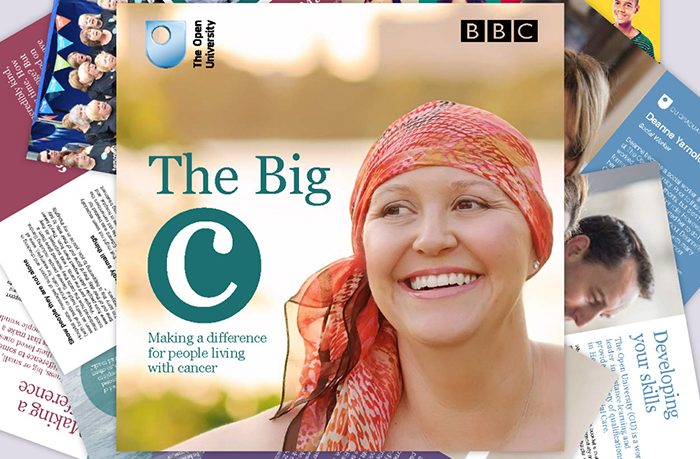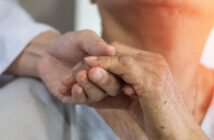Two and a half million people are living with cancer in Britain. But what is the impact on a patient once they receive the diagnosis and how do they, and their families and friends, cope with everything the disease then throws at them?
The Big C and Me is a BBC/Open University co-production delving into the lives of cancer patients and bringing their personal – and very moving – stories into the viewer’s home. It’s a three-part series which enters the personal world of cancer patients and their families encountering different stages of their cancer journey.
Professor of Nursing Jan Draper and Dr Mathijs Lucassen, a Lecturer in Mental Health, were both involved in the series and produced a booklet to accompany it, aimed at helping to support people living with cancer.
Here are five ways you can help make a difference to people living with cancer…
1) Be yourself
People find it hard to find the words when someone they know is diagnosed with cancer, says Professor Draper, but for most cancer patients they want to be treated normally.
“Having cancer can be really life changing but a lot of people we talked to just wanted to be treated normally. Obviously, recognise there is important stuff going on but treat them as you usually would, and be yourself,” she says. “If the person is someone you have humorous banter with, then continue to do that, but be sensitive and if you get it wrong, hold your hands up and say you got it wrong.”
2) Little things have a big impact
When someone is ill – even if they don’t look ill – then small offers of help can go a long way. “Some of the practical elements make a real difference, for example, taking a meal round, doing the shopping, helping to take the children to school,” says Professor Draper.
Practical support, no matter how trivial it may seem, can really help when someone is ill and tired and trying to juggle everyday tasks and normal family life while dealing with a potentially life-changing illness, she adds.
“Even popping round with flowers or a cake could mean a lot. It sounds obvious but we’re always touched by little acts of kindness which show someone has been thinking of you; that can mean a lot.”
Dr Lucassen added: “Lots of people we talked to spoke about the value of cards and how meaningful it was to receive them. People saying ‘you’re in my thoughts, you’re in my prayers, I’m thinking of you’. It meant a lot.”
The booklet also discusses alternative ways of communicating because receiving phone calls and visitors can get tiring: it could be a card, a text message, a bunch of flowers or an email.
“One friend emailed me with silly jokes, it was her way of saying she’s thinking of me,” said one contributor to the booklet.
3) Volunteer your time
Whether or not you know someone directly affected by cancer or not, there are still ways to help make a difference.
“So many people put their skills and energy into helping others and it’s about getting the right mix between the volunteer and what’s available locally, so start by getting in touch with charities,” says Dr Lucassen.
“In writing the booklet about support for those dealing with cancer, it became apparent that the elephant in the room was death. So for some people it’s not just about adjusting to living with cancer but dying with cancer too. Local hospices reply on support, so they also recruit volunteers. There’s a whole range of things from flower arranging to occupational therapy-type roles and more patient-facing roles,” adds Professor Draper. “And there’s always fundraising too.”
4) Talk, but don’t forget to listen
“One of the key themes that came up during discussions with people was the importance of really listening; it’s not about having to give advice or offer solutions. You don’t have to feel like you have all the answers, just being able to listen is important to people with cancer,” says Dr Lucassen.
Provide opportunities to talk and show you’re really listening with your body language, sometimes the chance to express what’s on your mind is enough to lift a burden. Asking open questions like “how are you today?” gives someone the opportunity to talk about the cancer, or not.
In this video, OU graduate Deanne talks about supporting cancer patients and working in a hospice…
5) Be in it for the long haul
Coping with cancer goes beyond initial diagnosis and starting treatment, it can last months or even years.
“It’s easy to forget the endurance of it all,” says Dr Lucassen, who says it’s important to be aware of the continuing challenges over a longer period for people dealing with cancer. And it won’t always be obvious.
“People living with cancer can actually look very well so you can make assumptions that aren’t correct. That’s what I’ve learned personally from my own experiences with cancer,” added Professor Draper.
Find out more:
- You can find out more about The Big C and Me on OpenLearn, including access to free health and social care courses and video interviews with OU graduates who work with cancer patients
- Order your copy of the booklet
- Find out how Jan and Mathijs were involved in the TV series



